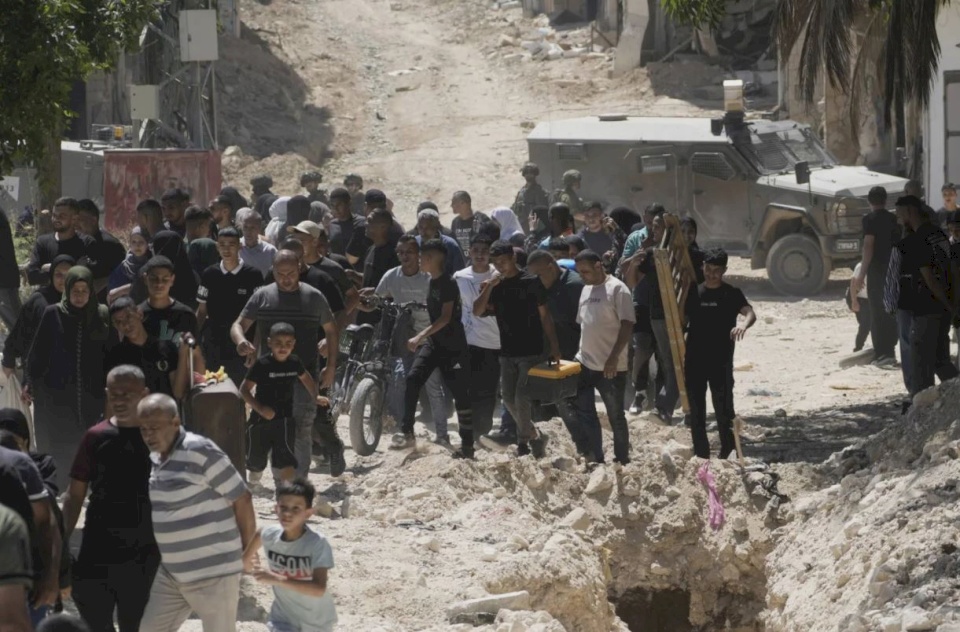
"Ghost Camps"... Displacement of Tens of Thousands in the West Bank Under the Weight of Israeli Operations
SadaNews - Malek Lutfi was torn with confusion as he thought about what belongings to take from his family's possessions during the brief moments allowed to him, as Israeli forces began demolishing homes in the Tulkarm refugee camp where he grew up, in the West Bank occupied by Israel.
Lutfi, a father of six and 51 years old, rented a small room in nearby Tulkarm city, but because he cannot reach his store where he repairs electronic devices in the besieged camp, he has no income to pay the rent, raising his concerns about his family's future.
Lutfi told the German news agency: "They displaced us on January 27, 2024, they took us out of our homes and evacuated us and told us not to come back; it's been 6 months without returning to Tulkarm camp."
He added: "We left with our hands; most people left without taking anything with them. If someone wants to retrieve their belongings from their home, they could be shot at or arrested. It’s difficult to enter when coordination is done to retrieve your things; you can't bring anything in an hour or two."
He said he knows a number of families in worse conditions than his, as they were forced to live in overcrowded schools or agricultural lands.
He continued: "We are waiting for assistance from the government and people who promised to help cover the rents and help with people's expenses."
The Israeli Information Center for Human Rights in the Occupied Territories (B'Tselem) states that Israeli operations are forcing tens of thousands of Palestinians in the West Bank, like Lutfi, to leave their homes.
B'Tselem, an independent center, reported that nearly 40,000 residents of the Tulkarm, Nur Shams, and Jenin camps were displaced due to military operations this year.
Israel claims it is acting to confront the activities of Palestinian militants, including in the cities of Tulkarm and Jenin in northern West Bank.
An Israeli army spokesperson stated in a statement yesterday Tuesday: "This requires demolishing buildings to allow the forces to operate freely and move without obstacles within the area."
The governor of Tulkarm, Abdullah Kmeil, noted that demolition operations have increased in recent weeks, with 106 homes and 104 other buildings destroyed in the adjacent Tulkarm and Nur Shams camps.
He added: "What is happening in Tulkarm is a continuing crime by an Israeli political decision; the issue has nothing to do with security."
He further stated: "The operation is ongoing; the destruction of infrastructure continues, leaving nothing in the camp; it has become a 'ghost camp' where there are only snipers in several places in the camps."
The Israeli operation in northern West Bank began in January and is one of the largest operations Israel has carried out since the Second Intifada over 20 years ago.
It involves several military units supported by drones and helicopters, as well as heavy combat tanks for the first time in decades.
As American and Qatari efforts to achieve a ceasefire agreement in Gaza intensify, some international officials and human rights groups have also expressed concern over the turbulent situations in the West Bank.
Shai Barns, director of communication at B'Tselem, stated that "Israel has started in northern West Bank to repeat the tactics and combat doctrines it refined in its current attack on Gaza."
He added: "This includes an increase in... the destruction of homes and civil infrastructure deliberately and on a large scale, and the forcible displacement of civilians from areas designated by the army as combat zones."
Right-wing extremists both within and outside the government have repeatedly called for the annexation of the West Bank, where Palestinians want to establish an independent state with East Jerusalem as its capital, which also includes Gaza Strip.
Ministers in the Israeli government deny that the operations in the West Bank have any aim other than fighting armed factions. The Israeli army stated that it adheres to international law and targets militants.
Governor Abdullah Kmeil noted that the displacement puts additional pressure on a community that is already economically suffering. Thousands have taken refuge in mosques, schools, and homes where they are crowded with relatives.
Lutfi, who returned for the first time in 6 months, expressed shock at the extent of the destruction that had occurred to the homes.
He added: "Most people left, and when they return to see their homes, they find them destroyed; the devastation is enormous, wide streets, destroyed infrastructure, electricity, internet. If you want to start rebuilding, it will take a long time."

High-level sources reveal to SadaNews: Washington seeks to hold a Gaza Reconstruction Conf...

Sources for SadaNews: Arrangements for a visit by a technocrat committee delegation to Gaz...

Permanent Intelligence Presence: Washington's Plan for Venezuela After Maduro

Reports: Investigations Revealed in a Security Case Related to Smuggling Goods from Israel...

Revealing that Settler Forced Two Italian Officers to Kneel Under Threat of Weapon in Rama...

Hebron.. The Empire of the Palestinian Economy that Horrifies Israel

The Jordanian and Israeli flags fly over the Baquoura Bridge on the border

